Tesco Operations Management: Leader, Manager, and Key Approaches
VerifiedAdded on 2020/02/17
|15
|4262
|379
Report
AI Summary
This report delves into the operations management of Tesco, a major player in the retail industry. It begins by differentiating between the roles and characteristics of leaders and managers within the organization, highlighting their distinct responsibilities and contributions. The report further explores how these roles apply in various situational contexts, emphasizing the importance of clear vision, decision-making, conflict resolution, team building, and risk-taking. It then examines the application of leadership models and theories, including situational, contingency, and system leadership, within Tesco to effectively manage operations. Finally, the report outlines key approaches to operations management, such as the dynamic approach, to optimize services, minimize costs, and maximize revenue. The analysis provides valuable insights into Tesco's operational strategies and their impact on the company's success.
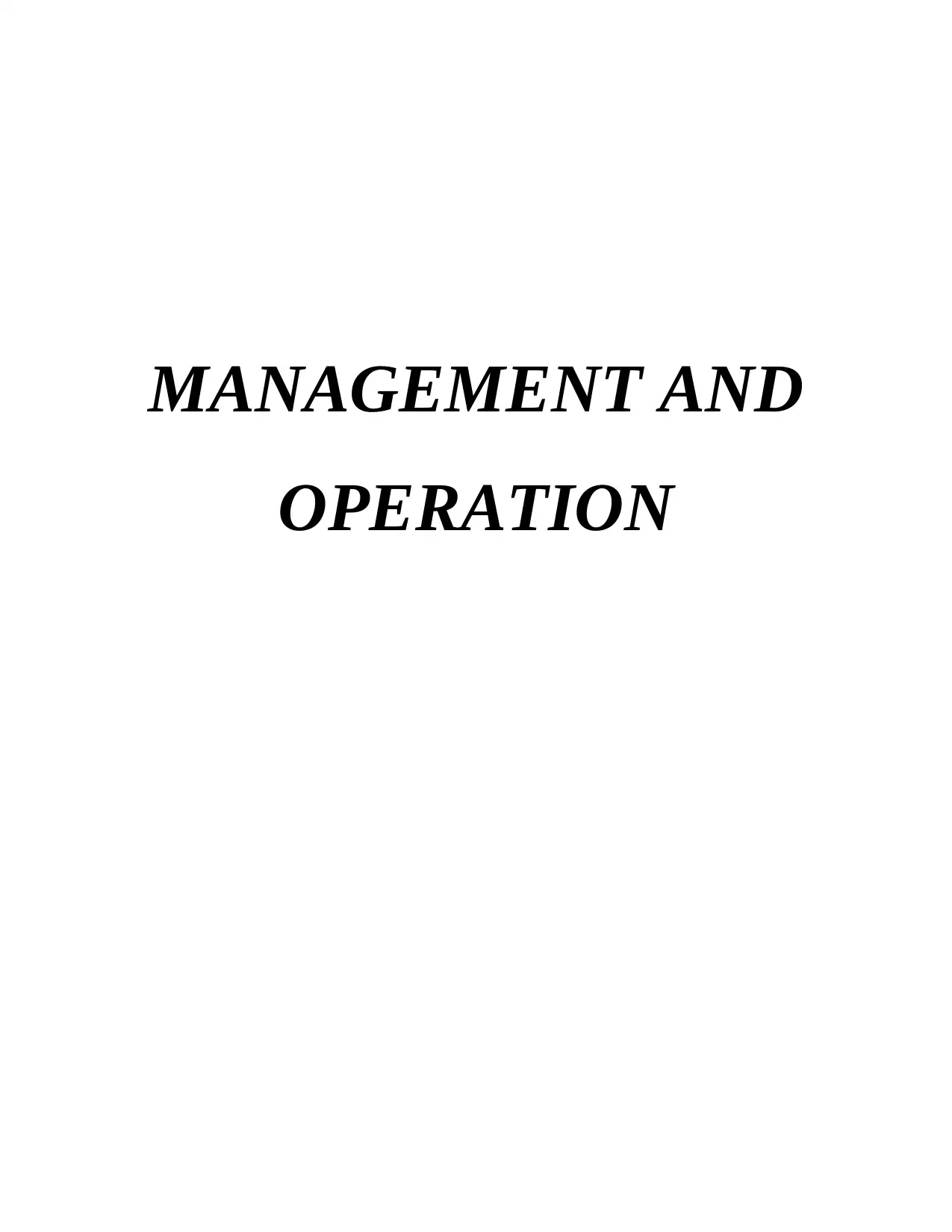
MANAGEMENT AND
OPERATION
OPERATION
Paraphrase This Document
Need a fresh take? Get an instant paraphrase of this document with our AI Paraphraser
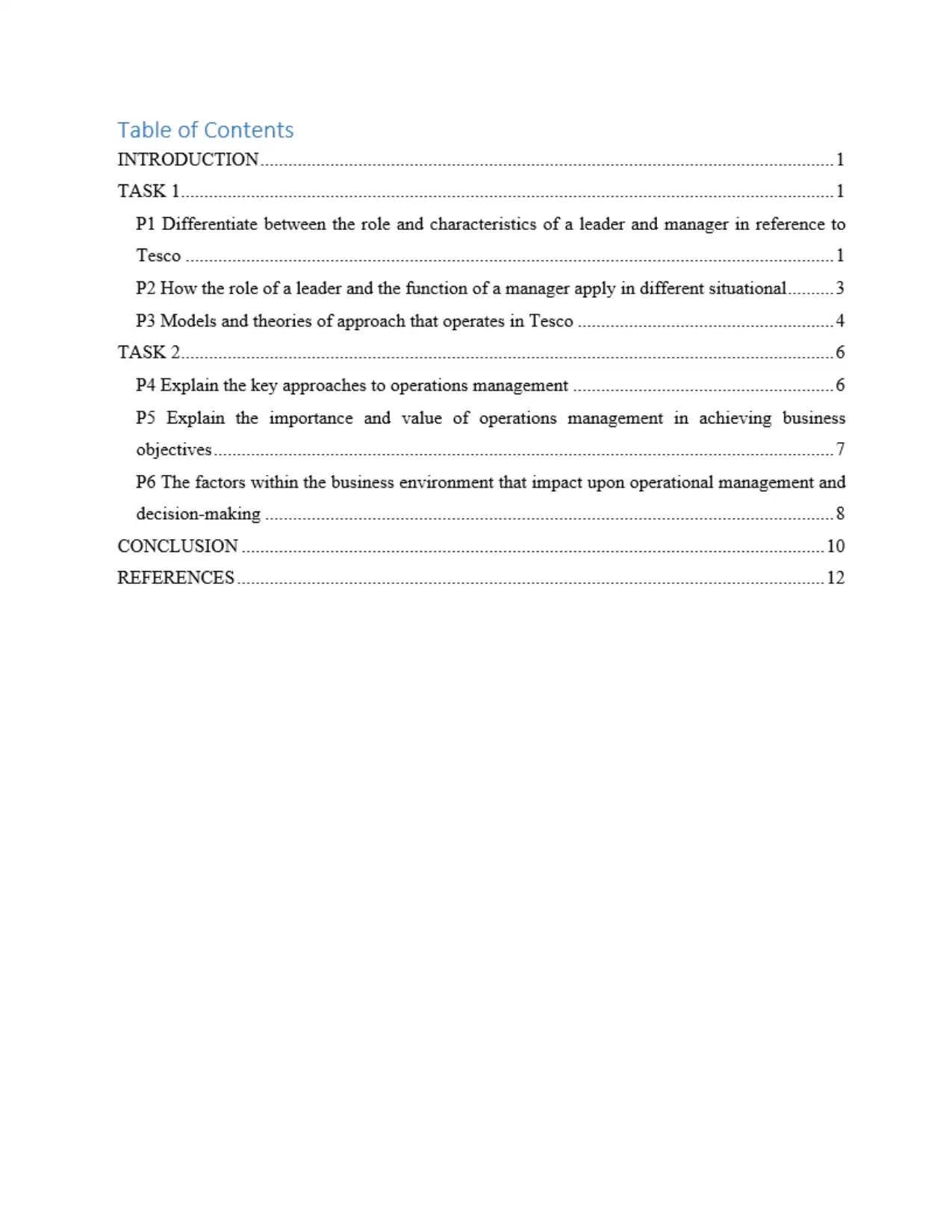
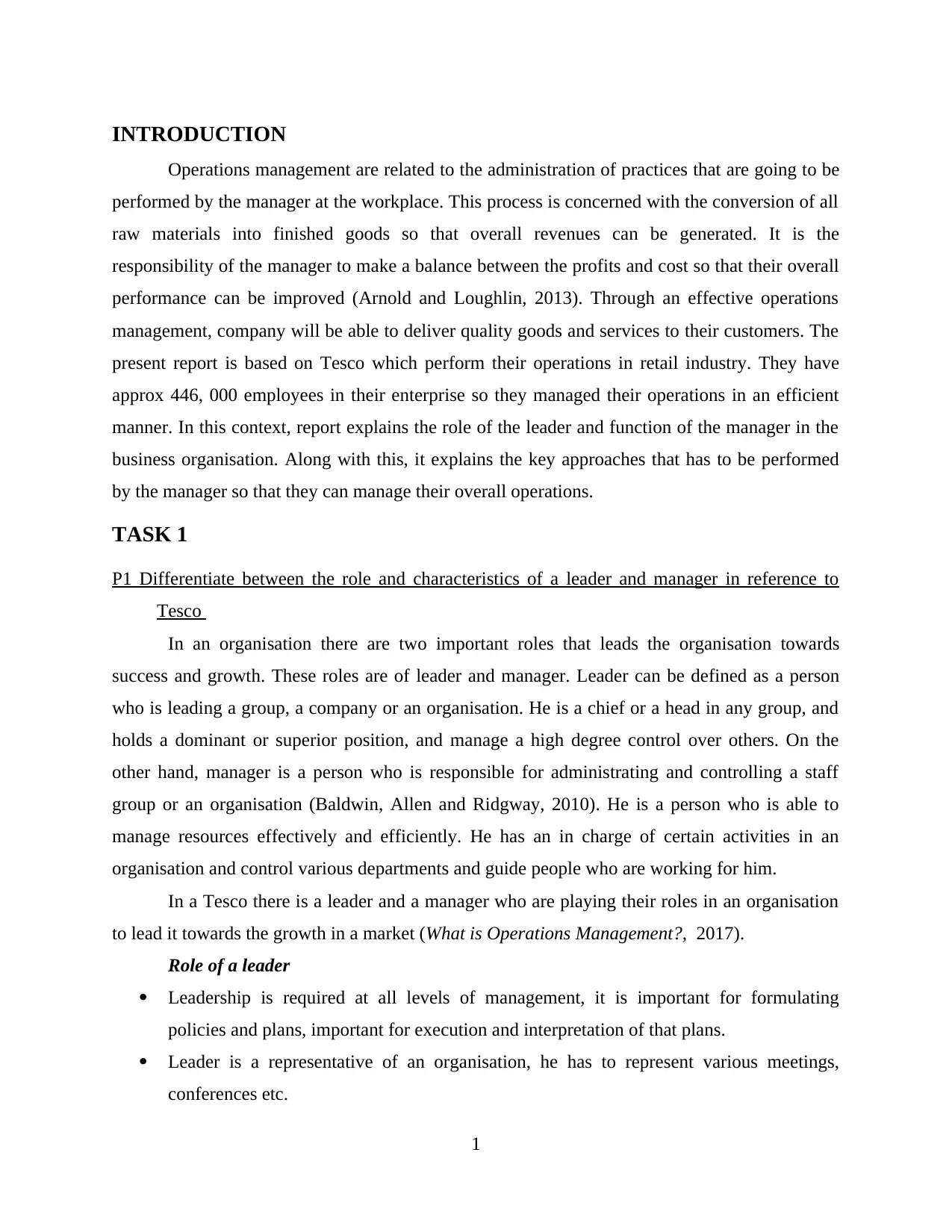
INTRODUCTION
Operations management are related to the administration of practices that are going to be
performed by the manager at the workplace. This process is concerned with the conversion of all
raw materials into finished goods so that overall revenues can be generated. It is the
responsibility of the manager to make a balance between the profits and cost so that their overall
performance can be improved (Arnold and Loughlin, 2013). Through an effective operations
management, company will be able to deliver quality goods and services to their customers. The
present report is based on Tesco which perform their operations in retail industry. They have
approx 446, 000 employees in their enterprise so they managed their operations in an efficient
manner. In this context, report explains the role of the leader and function of the manager in the
business organisation. Along with this, it explains the key approaches that has to be performed
by the manager so that they can manage their overall operations.
TASK 1
P1 Differentiate between the role and characteristics of a leader and manager in reference to
Tesco
In an organisation there are two important roles that leads the organisation towards
success and growth. These roles are of leader and manager. Leader can be defined as a person
who is leading a group, a company or an organisation. He is a chief or a head in any group, and
holds a dominant or superior position, and manage a high degree control over others. On the
other hand, manager is a person who is responsible for administrating and controlling a staff
group or an organisation (Baldwin, Allen and Ridgway, 2010). He is a person who is able to
manage resources effectively and efficiently. He has an in charge of certain activities in an
organisation and control various departments and guide people who are working for him.
In a Tesco there is a leader and a manager who are playing their roles in an organisation
to lead it towards the growth in a market (What is Operations Management?, 2017).
Role of a leader
Leadership is required at all levels of management, it is important for formulating
policies and plans, important for execution and interpretation of that plans.
Leader is a representative of an organisation, he has to represent various meetings,
conferences etc.
1
Operations management are related to the administration of practices that are going to be
performed by the manager at the workplace. This process is concerned with the conversion of all
raw materials into finished goods so that overall revenues can be generated. It is the
responsibility of the manager to make a balance between the profits and cost so that their overall
performance can be improved (Arnold and Loughlin, 2013). Through an effective operations
management, company will be able to deliver quality goods and services to their customers. The
present report is based on Tesco which perform their operations in retail industry. They have
approx 446, 000 employees in their enterprise so they managed their operations in an efficient
manner. In this context, report explains the role of the leader and function of the manager in the
business organisation. Along with this, it explains the key approaches that has to be performed
by the manager so that they can manage their overall operations.
TASK 1
P1 Differentiate between the role and characteristics of a leader and manager in reference to
Tesco
In an organisation there are two important roles that leads the organisation towards
success and growth. These roles are of leader and manager. Leader can be defined as a person
who is leading a group, a company or an organisation. He is a chief or a head in any group, and
holds a dominant or superior position, and manage a high degree control over others. On the
other hand, manager is a person who is responsible for administrating and controlling a staff
group or an organisation (Baldwin, Allen and Ridgway, 2010). He is a person who is able to
manage resources effectively and efficiently. He has an in charge of certain activities in an
organisation and control various departments and guide people who are working for him.
In a Tesco there is a leader and a manager who are playing their roles in an organisation
to lead it towards the growth in a market (What is Operations Management?, 2017).
Role of a leader
Leadership is required at all levels of management, it is important for formulating
policies and plans, important for execution and interpretation of that plans.
Leader is a representative of an organisation, he has to represent various meetings,
conferences etc.
1
⊘ This is a preview!⊘
Do you want full access?
Subscribe today to unlock all pages.

Trusted by 1+ million students worldwide
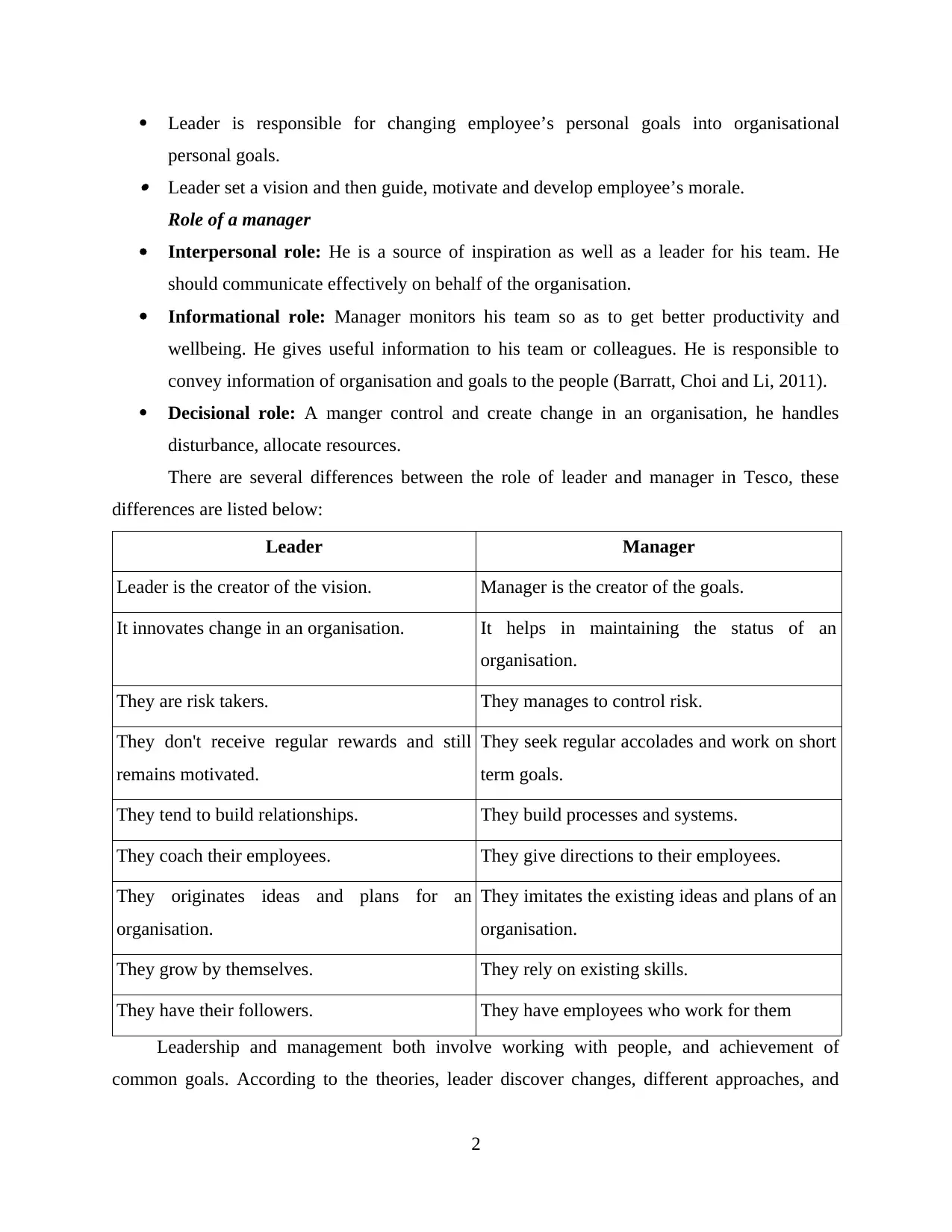
Leader is responsible for changing employee’s personal goals into organisational
personal goals. Leader set a vision and then guide, motivate and develop employee’s morale.
Role of a manager
Interpersonal role: He is a source of inspiration as well as a leader for his team. He
should communicate effectively on behalf of the organisation.
Informational role: Manager monitors his team so as to get better productivity and
wellbeing. He gives useful information to his team or colleagues. He is responsible to
convey information of organisation and goals to the people (Barratt, Choi and Li, 2011).
Decisional role: A manger control and create change in an organisation, he handles
disturbance, allocate resources.
There are several differences between the role of leader and manager in Tesco, these
differences are listed below:
Leader Manager
Leader is the creator of the vision. Manager is the creator of the goals.
It innovates change in an organisation. It helps in maintaining the status of an
organisation.
They are risk takers. They manages to control risk.
They don't receive regular rewards and still
remains motivated.
They seek regular accolades and work on short
term goals.
They tend to build relationships. They build processes and systems.
They coach their employees. They give directions to their employees.
They originates ideas and plans for an
organisation.
They imitates the existing ideas and plans of an
organisation.
They grow by themselves. They rely on existing skills.
They have their followers. They have employees who work for them
Leadership and management both involve working with people, and achievement of
common goals. According to the theories, leader discover changes, different approaches, and
2
personal goals. Leader set a vision and then guide, motivate and develop employee’s morale.
Role of a manager
Interpersonal role: He is a source of inspiration as well as a leader for his team. He
should communicate effectively on behalf of the organisation.
Informational role: Manager monitors his team so as to get better productivity and
wellbeing. He gives useful information to his team or colleagues. He is responsible to
convey information of organisation and goals to the people (Barratt, Choi and Li, 2011).
Decisional role: A manger control and create change in an organisation, he handles
disturbance, allocate resources.
There are several differences between the role of leader and manager in Tesco, these
differences are listed below:
Leader Manager
Leader is the creator of the vision. Manager is the creator of the goals.
It innovates change in an organisation. It helps in maintaining the status of an
organisation.
They are risk takers. They manages to control risk.
They don't receive regular rewards and still
remains motivated.
They seek regular accolades and work on short
term goals.
They tend to build relationships. They build processes and systems.
They coach their employees. They give directions to their employees.
They originates ideas and plans for an
organisation.
They imitates the existing ideas and plans of an
organisation.
They grow by themselves. They rely on existing skills.
They have their followers. They have employees who work for them
Leadership and management both involve working with people, and achievement of
common goals. According to the theories, leader discover changes, different approaches, and
2
Paraphrase This Document
Need a fresh take? Get an instant paraphrase of this document with our AI Paraphraser
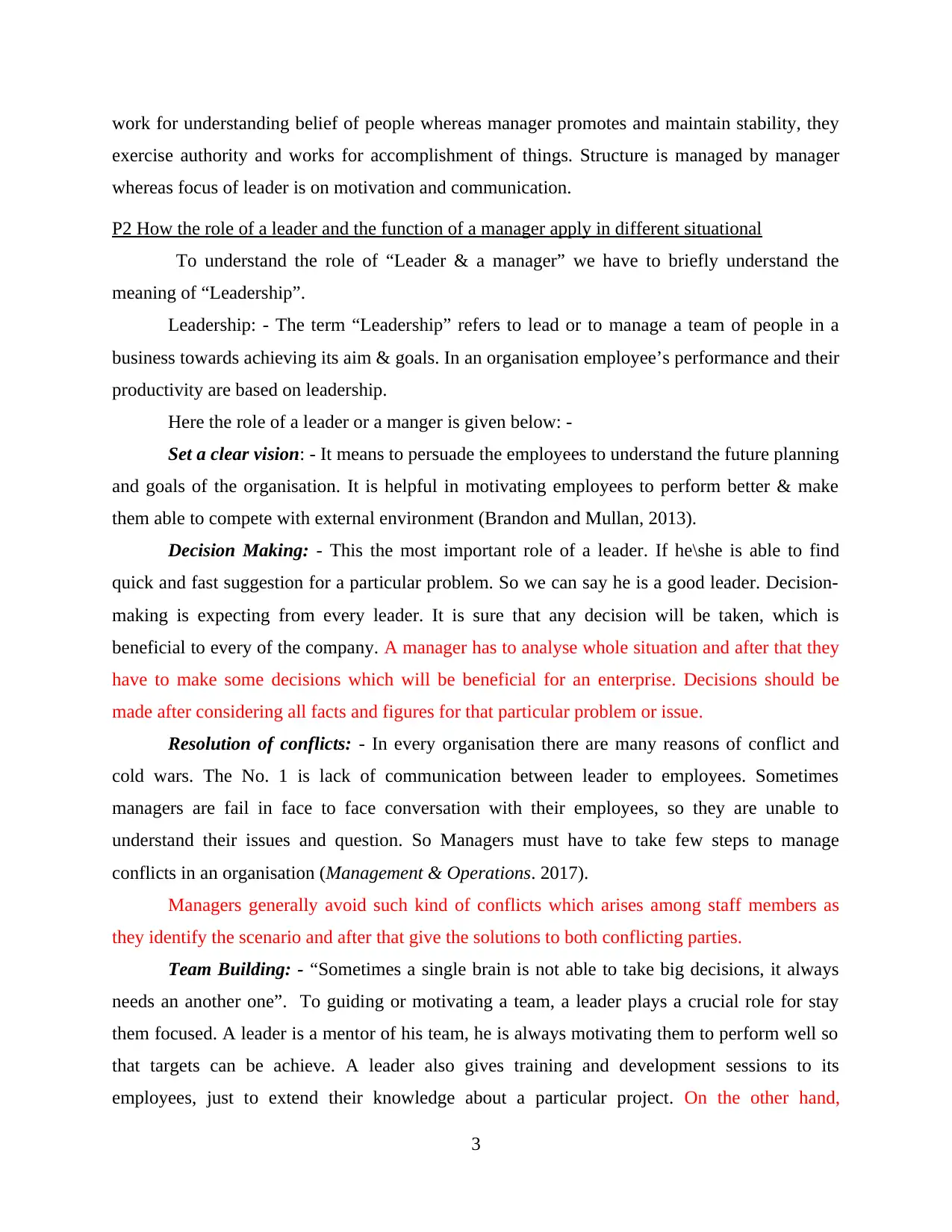
work for understanding belief of people whereas manager promotes and maintain stability, they
exercise authority and works for accomplishment of things. Structure is managed by manager
whereas focus of leader is on motivation and communication.
P2 How the role of a leader and the function of a manager apply in different situational
To understand the role of “Leader & a manager” we have to briefly understand the
meaning of “Leadership”.
Leadership: - The term “Leadership” refers to lead or to manage a team of people in a
business towards achieving its aim & goals. In an organisation employee’s performance and their
productivity are based on leadership.
Here the role of a leader or a manger is given below: -
Set a clear vision: - It means to persuade the employees to understand the future planning
and goals of the organisation. It is helpful in motivating employees to perform better & make
them able to compete with external environment (Brandon and Mullan, 2013).
Decision Making: - This the most important role of a leader. If he\she is able to find
quick and fast suggestion for a particular problem. So we can say he is a good leader. Decision-
making is expecting from every leader. It is sure that any decision will be taken, which is
beneficial to every of the company. A manager has to analyse whole situation and after that they
have to make some decisions which will be beneficial for an enterprise. Decisions should be
made after considering all facts and figures for that particular problem or issue.
Resolution of conflicts: - In every organisation there are many reasons of conflict and
cold wars. The No. 1 is lack of communication between leader to employees. Sometimes
managers are fail in face to face conversation with their employees, so they are unable to
understand their issues and question. So Managers must have to take few steps to manage
conflicts in an organisation (Management & Operations. 2017).
Managers generally avoid such kind of conflicts which arises among staff members as
they identify the scenario and after that give the solutions to both conflicting parties.
Team Building: - “Sometimes a single brain is not able to take big decisions, it always
needs an another one”. To guiding or motivating a team, a leader plays a crucial role for stay
them focused. A leader is a mentor of his team, he is always motivating them to perform well so
that targets can be achieve. A leader also gives training and development sessions to its
employees, just to extend their knowledge about a particular project. On the other hand,
3
exercise authority and works for accomplishment of things. Structure is managed by manager
whereas focus of leader is on motivation and communication.
P2 How the role of a leader and the function of a manager apply in different situational
To understand the role of “Leader & a manager” we have to briefly understand the
meaning of “Leadership”.
Leadership: - The term “Leadership” refers to lead or to manage a team of people in a
business towards achieving its aim & goals. In an organisation employee’s performance and their
productivity are based on leadership.
Here the role of a leader or a manger is given below: -
Set a clear vision: - It means to persuade the employees to understand the future planning
and goals of the organisation. It is helpful in motivating employees to perform better & make
them able to compete with external environment (Brandon and Mullan, 2013).
Decision Making: - This the most important role of a leader. If he\she is able to find
quick and fast suggestion for a particular problem. So we can say he is a good leader. Decision-
making is expecting from every leader. It is sure that any decision will be taken, which is
beneficial to every of the company. A manager has to analyse whole situation and after that they
have to make some decisions which will be beneficial for an enterprise. Decisions should be
made after considering all facts and figures for that particular problem or issue.
Resolution of conflicts: - In every organisation there are many reasons of conflict and
cold wars. The No. 1 is lack of communication between leader to employees. Sometimes
managers are fail in face to face conversation with their employees, so they are unable to
understand their issues and question. So Managers must have to take few steps to manage
conflicts in an organisation (Management & Operations. 2017).
Managers generally avoid such kind of conflicts which arises among staff members as
they identify the scenario and after that give the solutions to both conflicting parties.
Team Building: - “Sometimes a single brain is not able to take big decisions, it always
needs an another one”. To guiding or motivating a team, a leader plays a crucial role for stay
them focused. A leader is a mentor of his team, he is always motivating them to perform well so
that targets can be achieve. A leader also gives training and development sessions to its
employees, just to extend their knowledge about a particular project. On the other hand,
3
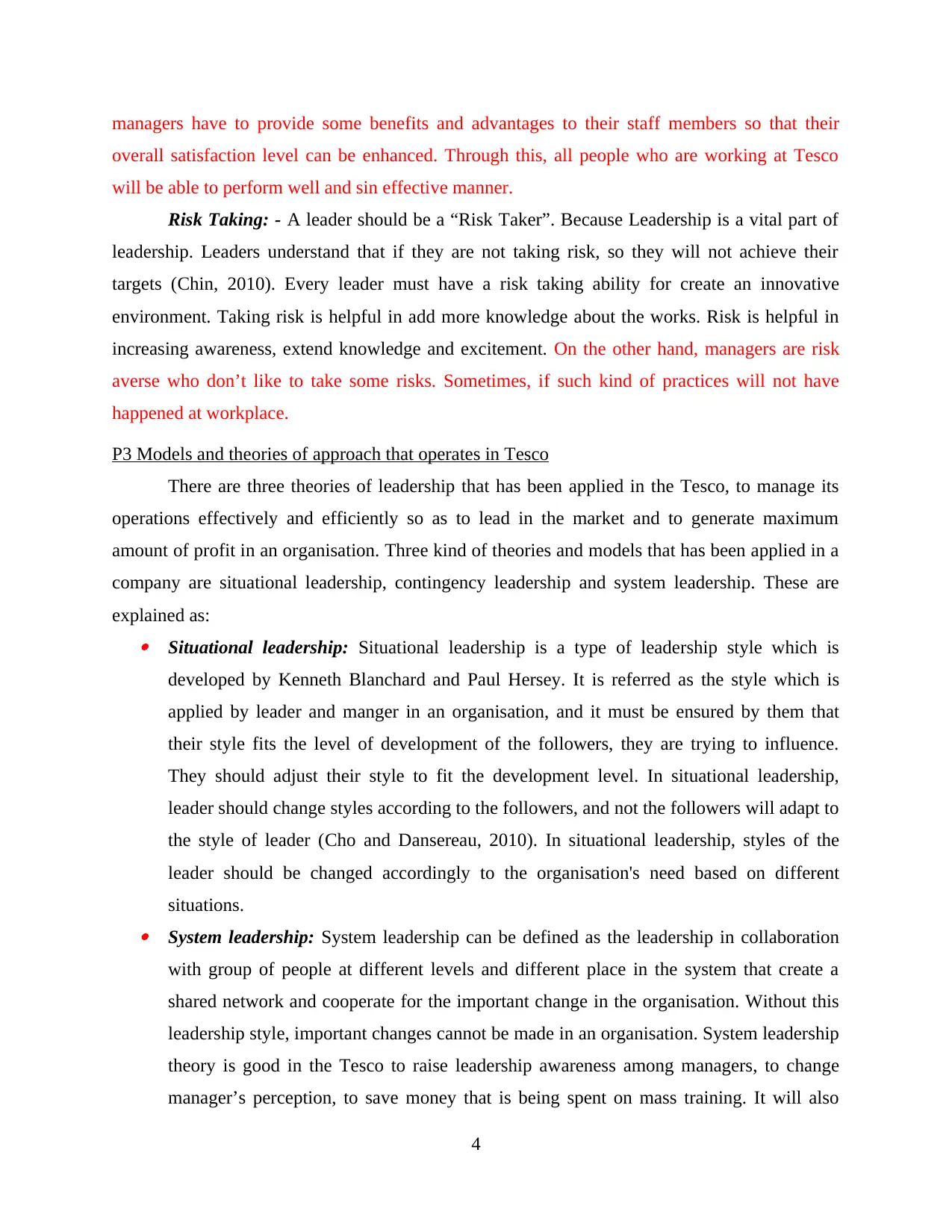
managers have to provide some benefits and advantages to their staff members so that their
overall satisfaction level can be enhanced. Through this, all people who are working at Tesco
will be able to perform well and sin effective manner.
Risk Taking: - A leader should be a “Risk Taker”. Because Leadership is a vital part of
leadership. Leaders understand that if they are not taking risk, so they will not achieve their
targets (Chin, 2010). Every leader must have a risk taking ability for create an innovative
environment. Taking risk is helpful in add more knowledge about the works. Risk is helpful in
increasing awareness, extend knowledge and excitement. On the other hand, managers are risk
averse who don’t like to take some risks. Sometimes, if such kind of practices will not have
happened at workplace.
P3 Models and theories of approach that operates in Tesco
There are three theories of leadership that has been applied in the Tesco, to manage its
operations effectively and efficiently so as to lead in the market and to generate maximum
amount of profit in an organisation. Three kind of theories and models that has been applied in a
company are situational leadership, contingency leadership and system leadership. These are
explained as: Situational leadership: Situational leadership is a type of leadership style which is
developed by Kenneth Blanchard and Paul Hersey. It is referred as the style which is
applied by leader and manger in an organisation, and it must be ensured by them that
their style fits the level of development of the followers, they are trying to influence.
They should adjust their style to fit the development level. In situational leadership,
leader should change styles according to the followers, and not the followers will adapt to
the style of leader (Cho and Dansereau, 2010). In situational leadership, styles of the
leader should be changed accordingly to the organisation's need based on different
situations. System leadership: System leadership can be defined as the leadership in collaboration
with group of people at different levels and different place in the system that create a
shared network and cooperate for the important change in the organisation. Without this
leadership style, important changes cannot be made in an organisation. System leadership
theory is good in the Tesco to raise leadership awareness among managers, to change
manager’s perception, to save money that is being spent on mass training. It will also
4
overall satisfaction level can be enhanced. Through this, all people who are working at Tesco
will be able to perform well and sin effective manner.
Risk Taking: - A leader should be a “Risk Taker”. Because Leadership is a vital part of
leadership. Leaders understand that if they are not taking risk, so they will not achieve their
targets (Chin, 2010). Every leader must have a risk taking ability for create an innovative
environment. Taking risk is helpful in add more knowledge about the works. Risk is helpful in
increasing awareness, extend knowledge and excitement. On the other hand, managers are risk
averse who don’t like to take some risks. Sometimes, if such kind of practices will not have
happened at workplace.
P3 Models and theories of approach that operates in Tesco
There are three theories of leadership that has been applied in the Tesco, to manage its
operations effectively and efficiently so as to lead in the market and to generate maximum
amount of profit in an organisation. Three kind of theories and models that has been applied in a
company are situational leadership, contingency leadership and system leadership. These are
explained as: Situational leadership: Situational leadership is a type of leadership style which is
developed by Kenneth Blanchard and Paul Hersey. It is referred as the style which is
applied by leader and manger in an organisation, and it must be ensured by them that
their style fits the level of development of the followers, they are trying to influence.
They should adjust their style to fit the development level. In situational leadership,
leader should change styles according to the followers, and not the followers will adapt to
the style of leader (Cho and Dansereau, 2010). In situational leadership, styles of the
leader should be changed accordingly to the organisation's need based on different
situations. System leadership: System leadership can be defined as the leadership in collaboration
with group of people at different levels and different place in the system that create a
shared network and cooperate for the important change in the organisation. Without this
leadership style, important changes cannot be made in an organisation. System leadership
theory is good in the Tesco to raise leadership awareness among managers, to change
manager’s perception, to save money that is being spent on mass training. It will also
4
⊘ This is a preview!⊘
Do you want full access?
Subscribe today to unlock all pages.

Trusted by 1+ million students worldwide
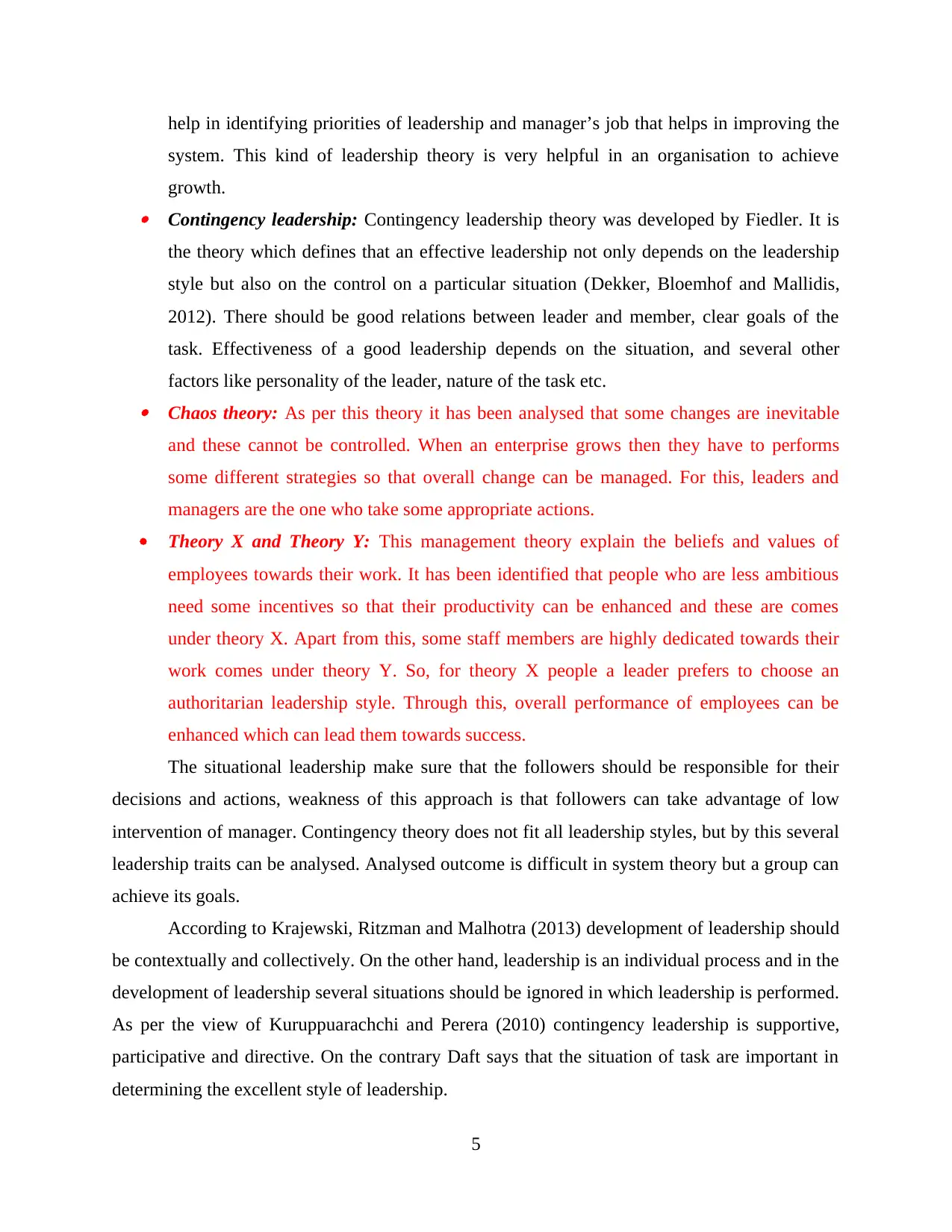
help in identifying priorities of leadership and manager’s job that helps in improving the
system. This kind of leadership theory is very helpful in an organisation to achieve
growth. Contingency leadership: Contingency leadership theory was developed by Fiedler. It is
the theory which defines that an effective leadership not only depends on the leadership
style but also on the control on a particular situation (Dekker, Bloemhof and Mallidis,
2012). There should be good relations between leader and member, clear goals of the
task. Effectiveness of a good leadership depends on the situation, and several other
factors like personality of the leader, nature of the task etc. Chaos theory: As per this theory it has been analysed that some changes are inevitable
and these cannot be controlled. When an enterprise grows then they have to performs
some different strategies so that overall change can be managed. For this, leaders and
managers are the one who take some appropriate actions.
Theory X and Theory Y: This management theory explain the beliefs and values of
employees towards their work. It has been identified that people who are less ambitious
need some incentives so that their productivity can be enhanced and these are comes
under theory X. Apart from this, some staff members are highly dedicated towards their
work comes under theory Y. So, for theory X people a leader prefers to choose an
authoritarian leadership style. Through this, overall performance of employees can be
enhanced which can lead them towards success.
The situational leadership make sure that the followers should be responsible for their
decisions and actions, weakness of this approach is that followers can take advantage of low
intervention of manager. Contingency theory does not fit all leadership styles, but by this several
leadership traits can be analysed. Analysed outcome is difficult in system theory but a group can
achieve its goals.
According to Krajewski, Ritzman and Malhotra (2013) development of leadership should
be contextually and collectively. On the other hand, leadership is an individual process and in the
development of leadership several situations should be ignored in which leadership is performed.
As per the view of Kuruppuarachchi and Perera (2010) contingency leadership is supportive,
participative and directive. On the contrary Daft says that the situation of task are important in
determining the excellent style of leadership.
5
system. This kind of leadership theory is very helpful in an organisation to achieve
growth. Contingency leadership: Contingency leadership theory was developed by Fiedler. It is
the theory which defines that an effective leadership not only depends on the leadership
style but also on the control on a particular situation (Dekker, Bloemhof and Mallidis,
2012). There should be good relations between leader and member, clear goals of the
task. Effectiveness of a good leadership depends on the situation, and several other
factors like personality of the leader, nature of the task etc. Chaos theory: As per this theory it has been analysed that some changes are inevitable
and these cannot be controlled. When an enterprise grows then they have to performs
some different strategies so that overall change can be managed. For this, leaders and
managers are the one who take some appropriate actions.
Theory X and Theory Y: This management theory explain the beliefs and values of
employees towards their work. It has been identified that people who are less ambitious
need some incentives so that their productivity can be enhanced and these are comes
under theory X. Apart from this, some staff members are highly dedicated towards their
work comes under theory Y. So, for theory X people a leader prefers to choose an
authoritarian leadership style. Through this, overall performance of employees can be
enhanced which can lead them towards success.
The situational leadership make sure that the followers should be responsible for their
decisions and actions, weakness of this approach is that followers can take advantage of low
intervention of manager. Contingency theory does not fit all leadership styles, but by this several
leadership traits can be analysed. Analysed outcome is difficult in system theory but a group can
achieve its goals.
According to Krajewski, Ritzman and Malhotra (2013) development of leadership should
be contextually and collectively. On the other hand, leadership is an individual process and in the
development of leadership several situations should be ignored in which leadership is performed.
As per the view of Kuruppuarachchi and Perera (2010) contingency leadership is supportive,
participative and directive. On the contrary Daft says that the situation of task are important in
determining the excellent style of leadership.
5
Paraphrase This Document
Need a fresh take? Get an instant paraphrase of this document with our AI Paraphraser
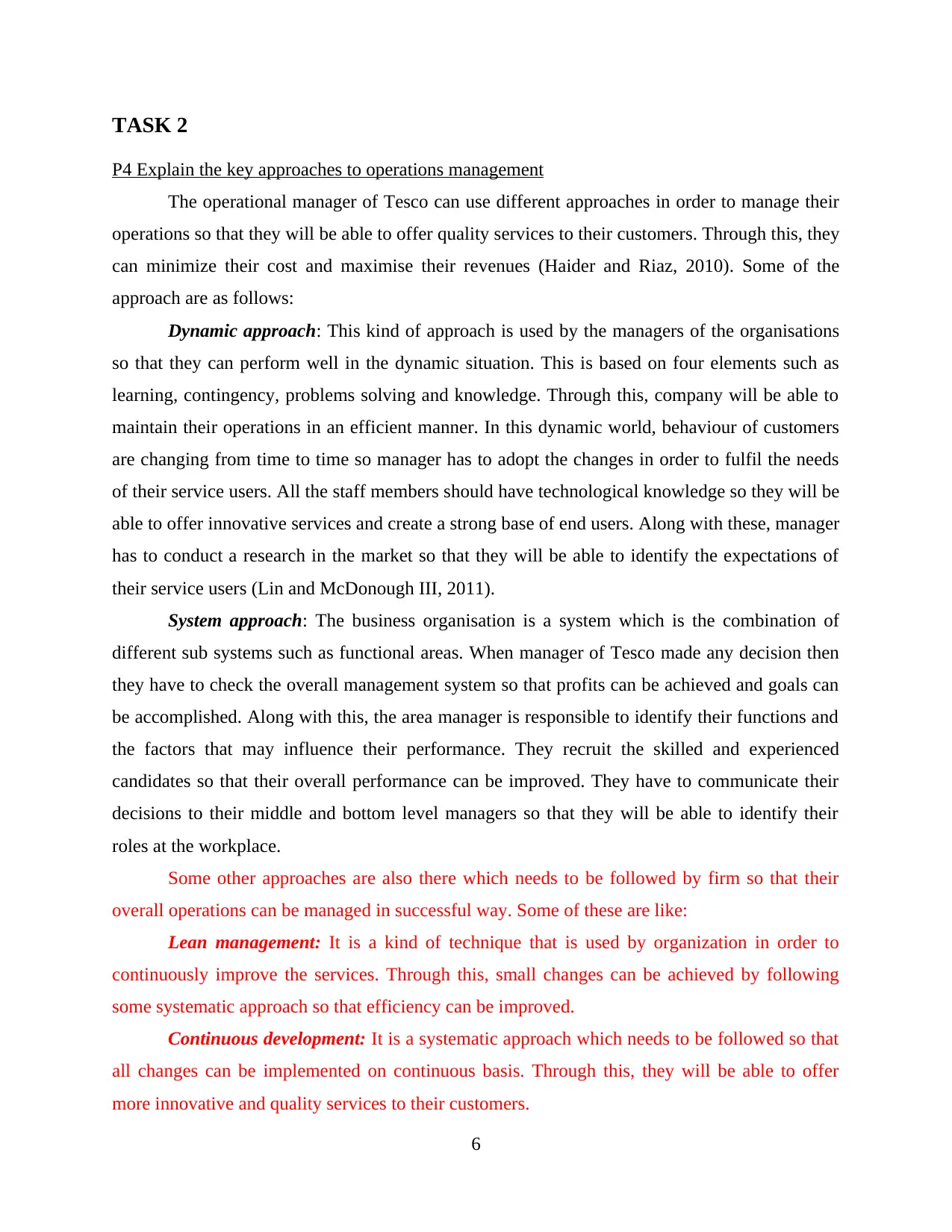
TASK 2
P4 Explain the key approaches to operations management
The operational manager of Tesco can use different approaches in order to manage their
operations so that they will be able to offer quality services to their customers. Through this, they
can minimize their cost and maximise their revenues (Haider and Riaz, 2010). Some of the
approach are as follows:
Dynamic approach: This kind of approach is used by the managers of the organisations
so that they can perform well in the dynamic situation. This is based on four elements such as
learning, contingency, problems solving and knowledge. Through this, company will be able to
maintain their operations in an efficient manner. In this dynamic world, behaviour of customers
are changing from time to time so manager has to adopt the changes in order to fulfil the needs
of their service users. All the staff members should have technological knowledge so they will be
able to offer innovative services and create a strong base of end users. Along with these, manager
has to conduct a research in the market so that they will be able to identify the expectations of
their service users (Lin and McDonough III, 2011).
System approach: The business organisation is a system which is the combination of
different sub systems such as functional areas. When manager of Tesco made any decision then
they have to check the overall management system so that profits can be achieved and goals can
be accomplished. Along with this, the area manager is responsible to identify their functions and
the factors that may influence their performance. They recruit the skilled and experienced
candidates so that their overall performance can be improved. They have to communicate their
decisions to their middle and bottom level managers so that they will be able to identify their
roles at the workplace.
Some other approaches are also there which needs to be followed by firm so that their
overall operations can be managed in successful way. Some of these are like:
Lean management: It is a kind of technique that is used by organization in order to
continuously improve the services. Through this, small changes can be achieved by following
some systematic approach so that efficiency can be improved.
Continuous development: It is a systematic approach which needs to be followed so that
all changes can be implemented on continuous basis. Through this, they will be able to offer
more innovative and quality services to their customers.
6
P4 Explain the key approaches to operations management
The operational manager of Tesco can use different approaches in order to manage their
operations so that they will be able to offer quality services to their customers. Through this, they
can minimize their cost and maximise their revenues (Haider and Riaz, 2010). Some of the
approach are as follows:
Dynamic approach: This kind of approach is used by the managers of the organisations
so that they can perform well in the dynamic situation. This is based on four elements such as
learning, contingency, problems solving and knowledge. Through this, company will be able to
maintain their operations in an efficient manner. In this dynamic world, behaviour of customers
are changing from time to time so manager has to adopt the changes in order to fulfil the needs
of their service users. All the staff members should have technological knowledge so they will be
able to offer innovative services and create a strong base of end users. Along with these, manager
has to conduct a research in the market so that they will be able to identify the expectations of
their service users (Lin and McDonough III, 2011).
System approach: The business organisation is a system which is the combination of
different sub systems such as functional areas. When manager of Tesco made any decision then
they have to check the overall management system so that profits can be achieved and goals can
be accomplished. Along with this, the area manager is responsible to identify their functions and
the factors that may influence their performance. They recruit the skilled and experienced
candidates so that their overall performance can be improved. They have to communicate their
decisions to their middle and bottom level managers so that they will be able to identify their
roles at the workplace.
Some other approaches are also there which needs to be followed by firm so that their
overall operations can be managed in successful way. Some of these are like:
Lean management: It is a kind of technique that is used by organization in order to
continuously improve the services. Through this, small changes can be achieved by following
some systematic approach so that efficiency can be improved.
Continuous development: It is a systematic approach which needs to be followed so that
all changes can be implemented on continuous basis. Through this, they will be able to offer
more innovative and quality services to their customers.
6
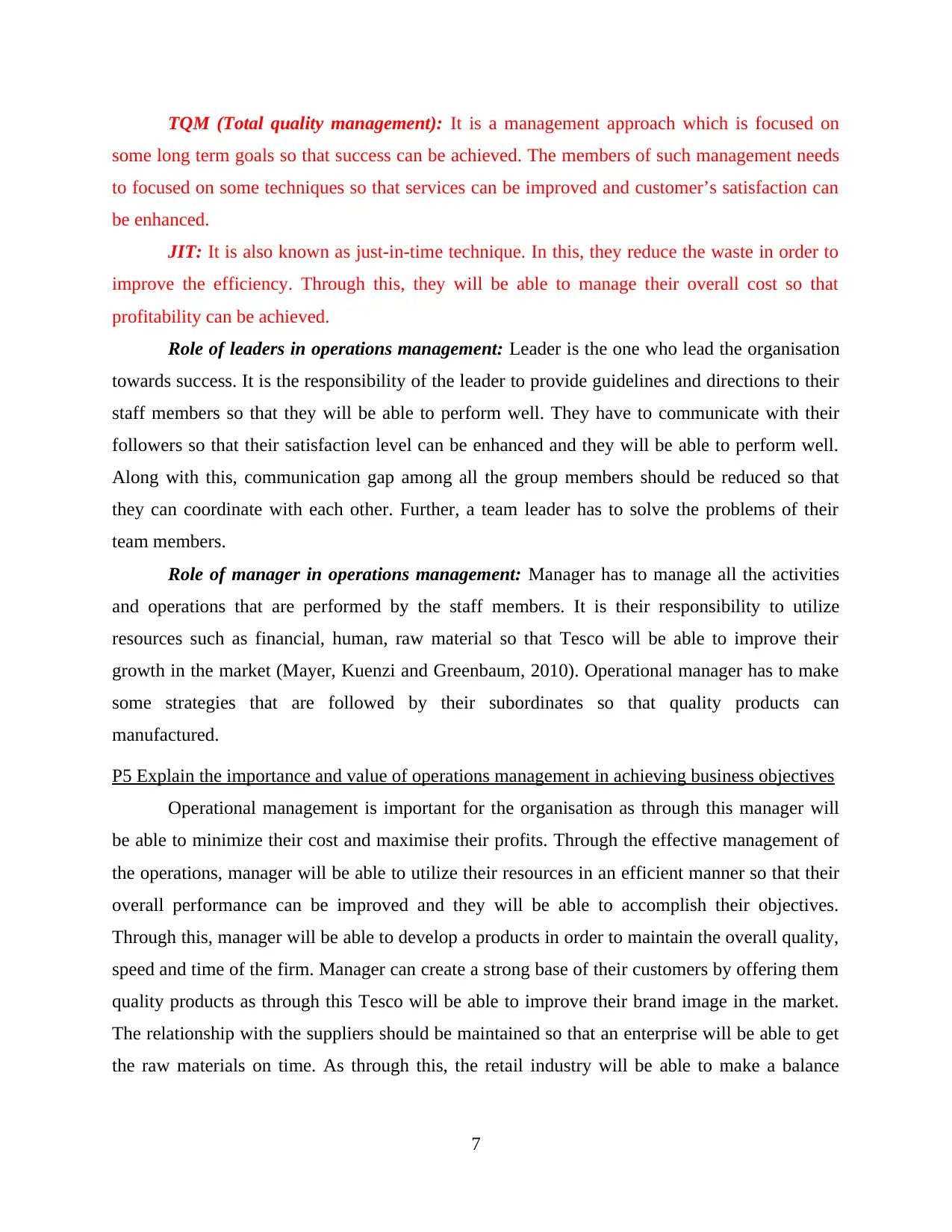
TQM (Total quality management): It is a management approach which is focused on
some long term goals so that success can be achieved. The members of such management needs
to focused on some techniques so that services can be improved and customer’s satisfaction can
be enhanced.
JIT: It is also known as just-in-time technique. In this, they reduce the waste in order to
improve the efficiency. Through this, they will be able to manage their overall cost so that
profitability can be achieved.
Role of leaders in operations management: Leader is the one who lead the organisation
towards success. It is the responsibility of the leader to provide guidelines and directions to their
staff members so that they will be able to perform well. They have to communicate with their
followers so that their satisfaction level can be enhanced and they will be able to perform well.
Along with this, communication gap among all the group members should be reduced so that
they can coordinate with each other. Further, a team leader has to solve the problems of their
team members.
Role of manager in operations management: Manager has to manage all the activities
and operations that are performed by the staff members. It is their responsibility to utilize
resources such as financial, human, raw material so that Tesco will be able to improve their
growth in the market (Mayer, Kuenzi and Greenbaum, 2010). Operational manager has to make
some strategies that are followed by their subordinates so that quality products can
manufactured.
P5 Explain the importance and value of operations management in achieving business objectives
Operational management is important for the organisation as through this manager will
be able to minimize their cost and maximise their profits. Through the effective management of
the operations, manager will be able to utilize their resources in an efficient manner so that their
overall performance can be improved and they will be able to accomplish their objectives.
Through this, manager will be able to develop a products in order to maintain the overall quality,
speed and time of the firm. Manager can create a strong base of their customers by offering them
quality products as through this Tesco will be able to improve their brand image in the market.
The relationship with the suppliers should be maintained so that an enterprise will be able to get
the raw materials on time. As through this, the retail industry will be able to make a balance
7
some long term goals so that success can be achieved. The members of such management needs
to focused on some techniques so that services can be improved and customer’s satisfaction can
be enhanced.
JIT: It is also known as just-in-time technique. In this, they reduce the waste in order to
improve the efficiency. Through this, they will be able to manage their overall cost so that
profitability can be achieved.
Role of leaders in operations management: Leader is the one who lead the organisation
towards success. It is the responsibility of the leader to provide guidelines and directions to their
staff members so that they will be able to perform well. They have to communicate with their
followers so that their satisfaction level can be enhanced and they will be able to perform well.
Along with this, communication gap among all the group members should be reduced so that
they can coordinate with each other. Further, a team leader has to solve the problems of their
team members.
Role of manager in operations management: Manager has to manage all the activities
and operations that are performed by the staff members. It is their responsibility to utilize
resources such as financial, human, raw material so that Tesco will be able to improve their
growth in the market (Mayer, Kuenzi and Greenbaum, 2010). Operational manager has to make
some strategies that are followed by their subordinates so that quality products can
manufactured.
P5 Explain the importance and value of operations management in achieving business objectives
Operational management is important for the organisation as through this manager will
be able to minimize their cost and maximise their profits. Through the effective management of
the operations, manager will be able to utilize their resources in an efficient manner so that their
overall performance can be improved and they will be able to accomplish their objectives.
Through this, manager will be able to develop a products in order to maintain the overall quality,
speed and time of the firm. Manager can create a strong base of their customers by offering them
quality products as through this Tesco will be able to improve their brand image in the market.
The relationship with the suppliers should be maintained so that an enterprise will be able to get
the raw materials on time. As through this, the retail industry will be able to make a balance
7
⊘ This is a preview!⊘
Do you want full access?
Subscribe today to unlock all pages.

Trusted by 1+ million students worldwide
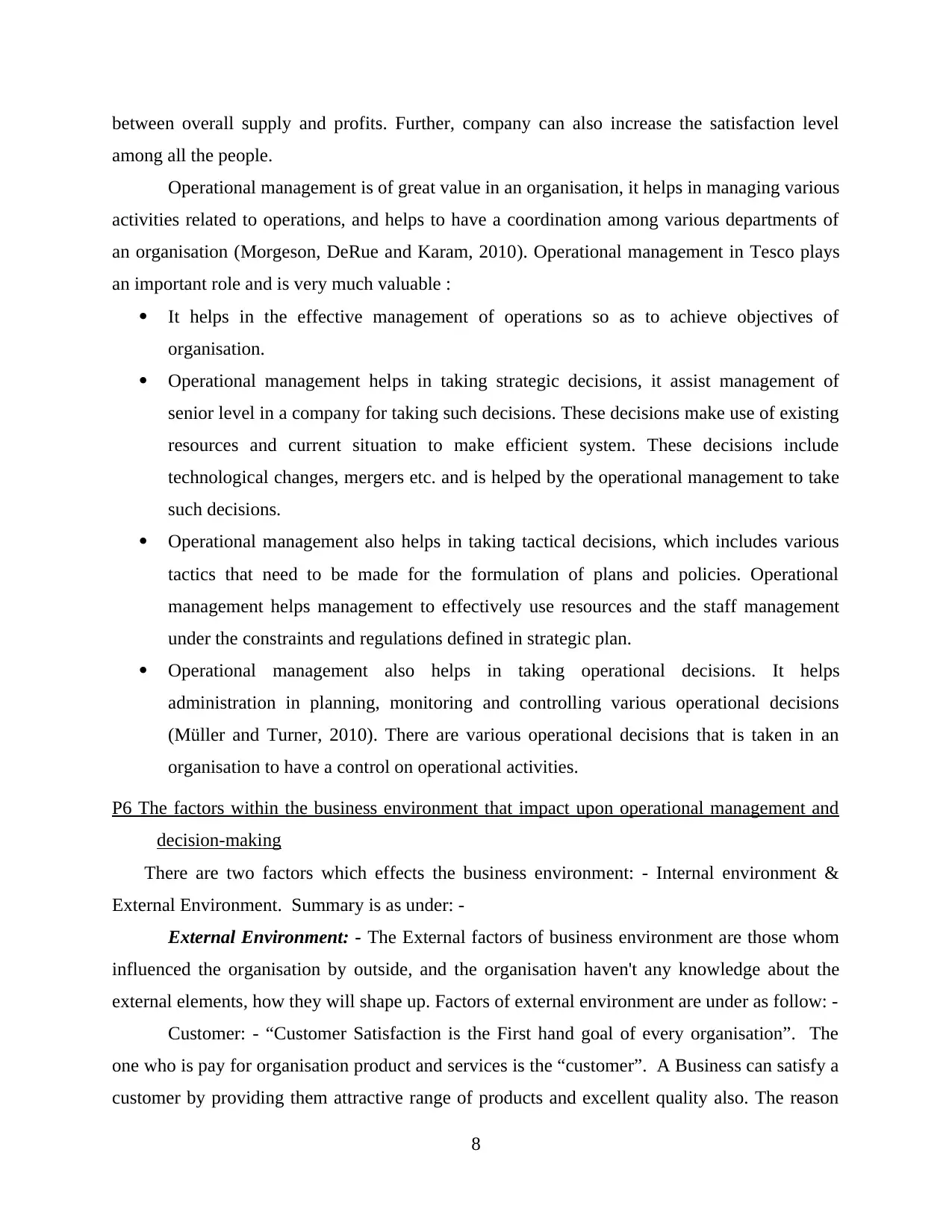
between overall supply and profits. Further, company can also increase the satisfaction level
among all the people.
Operational management is of great value in an organisation, it helps in managing various
activities related to operations, and helps to have a coordination among various departments of
an organisation (Morgeson, DeRue and Karam, 2010). Operational management in Tesco plays
an important role and is very much valuable :
It helps in the effective management of operations so as to achieve objectives of
organisation.
Operational management helps in taking strategic decisions, it assist management of
senior level in a company for taking such decisions. These decisions make use of existing
resources and current situation to make efficient system. These decisions include
technological changes, mergers etc. and is helped by the operational management to take
such decisions.
Operational management also helps in taking tactical decisions, which includes various
tactics that need to be made for the formulation of plans and policies. Operational
management helps management to effectively use resources and the staff management
under the constraints and regulations defined in strategic plan.
Operational management also helps in taking operational decisions. It helps
administration in planning, monitoring and controlling various operational decisions
(Müller and Turner, 2010). There are various operational decisions that is taken in an
organisation to have a control on operational activities.
P6 The factors within the business environment that impact upon operational management and
decision-making
There are two factors which effects the business environment: - Internal environment &
External Environment. Summary is as under: -
External Environment: - The External factors of business environment are those whom
influenced the organisation by outside, and the organisation haven't any knowledge about the
external elements, how they will shape up. Factors of external environment are under as follow: -
Customer: - “Customer Satisfaction is the First hand goal of every organisation”. The
one who is pay for organisation product and services is the “customer”. A Business can satisfy a
customer by providing them attractive range of products and excellent quality also. The reason
8
among all the people.
Operational management is of great value in an organisation, it helps in managing various
activities related to operations, and helps to have a coordination among various departments of
an organisation (Morgeson, DeRue and Karam, 2010). Operational management in Tesco plays
an important role and is very much valuable :
It helps in the effective management of operations so as to achieve objectives of
organisation.
Operational management helps in taking strategic decisions, it assist management of
senior level in a company for taking such decisions. These decisions make use of existing
resources and current situation to make efficient system. These decisions include
technological changes, mergers etc. and is helped by the operational management to take
such decisions.
Operational management also helps in taking tactical decisions, which includes various
tactics that need to be made for the formulation of plans and policies. Operational
management helps management to effectively use resources and the staff management
under the constraints and regulations defined in strategic plan.
Operational management also helps in taking operational decisions. It helps
administration in planning, monitoring and controlling various operational decisions
(Müller and Turner, 2010). There are various operational decisions that is taken in an
organisation to have a control on operational activities.
P6 The factors within the business environment that impact upon operational management and
decision-making
There are two factors which effects the business environment: - Internal environment &
External Environment. Summary is as under: -
External Environment: - The External factors of business environment are those whom
influenced the organisation by outside, and the organisation haven't any knowledge about the
external elements, how they will shape up. Factors of external environment are under as follow: -
Customer: - “Customer Satisfaction is the First hand goal of every organisation”. The
one who is pay for organisation product and services is the “customer”. A Business can satisfy a
customer by providing them attractive range of products and excellent quality also. The reason
8
Paraphrase This Document
Need a fresh take? Get an instant paraphrase of this document with our AI Paraphraser
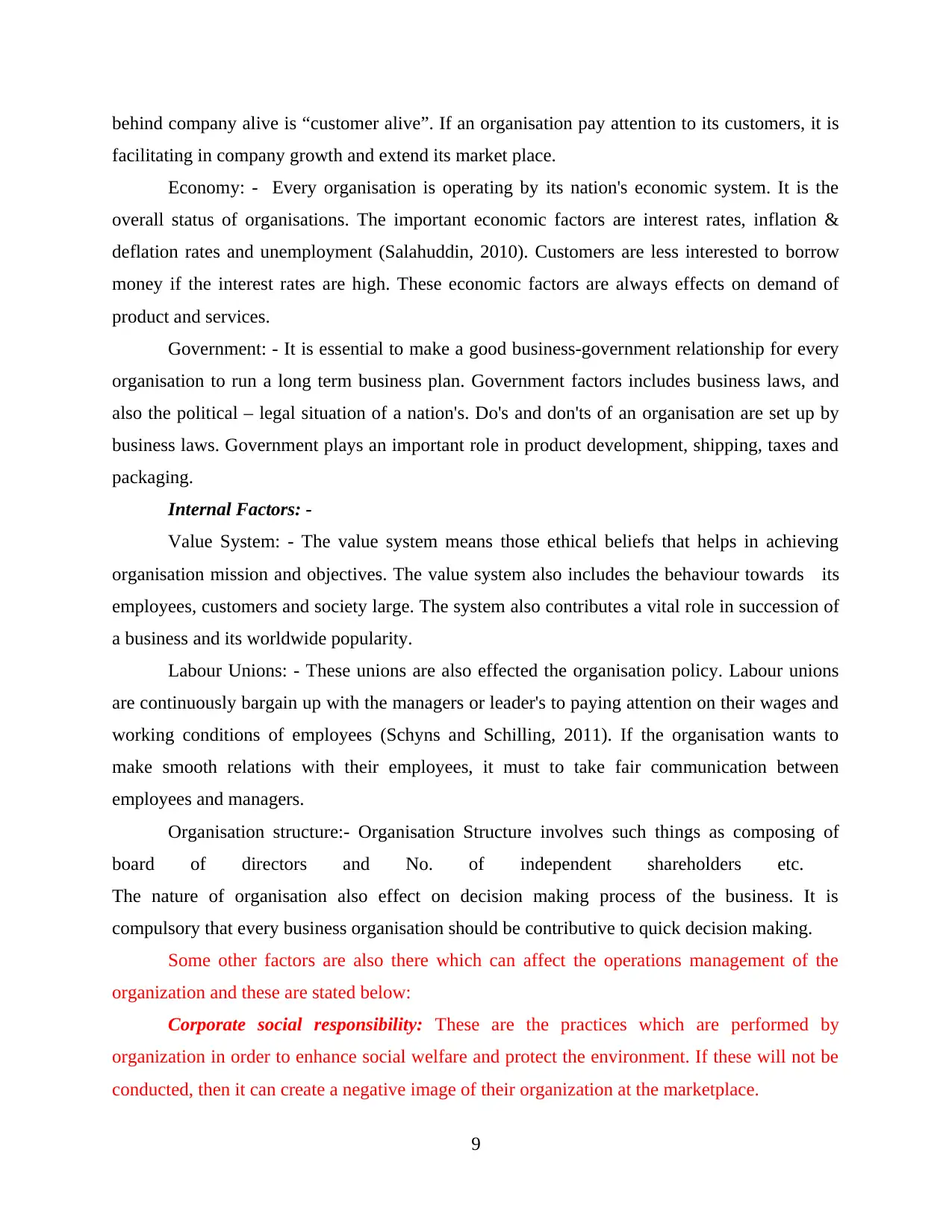
behind company alive is “customer alive”. If an organisation pay attention to its customers, it is
facilitating in company growth and extend its market place.
Economy: - Every organisation is operating by its nation's economic system. It is the
overall status of organisations. The important economic factors are interest rates, inflation &
deflation rates and unemployment (Salahuddin, 2010). Customers are less interested to borrow
money if the interest rates are high. These economic factors are always effects on demand of
product and services.
Government: - It is essential to make a good business-government relationship for every
organisation to run a long term business plan. Government factors includes business laws, and
also the political – legal situation of a nation's. Do's and don'ts of an organisation are set up by
business laws. Government plays an important role in product development, shipping, taxes and
packaging.
Internal Factors: -
Value System: - The value system means those ethical beliefs that helps in achieving
organisation mission and objectives. The value system also includes the behaviour towards its
employees, customers and society large. The system also contributes a vital role in succession of
a business and its worldwide popularity.
Labour Unions: - These unions are also effected the organisation policy. Labour unions
are continuously bargain up with the managers or leader's to paying attention on their wages and
working conditions of employees (Schyns and Schilling, 2011). If the organisation wants to
make smooth relations with their employees, it must to take fair communication between
employees and managers.
Organisation structure:- Organisation Structure involves such things as composing of
board of directors and No. of independent shareholders etc.
The nature of organisation also effect on decision making process of the business. It is
compulsory that every business organisation should be contributive to quick decision making.
Some other factors are also there which can affect the operations management of the
organization and these are stated below:
Corporate social responsibility: These are the practices which are performed by
organization in order to enhance social welfare and protect the environment. If these will not be
conducted, then it can create a negative image of their organization at the marketplace.
9
facilitating in company growth and extend its market place.
Economy: - Every organisation is operating by its nation's economic system. It is the
overall status of organisations. The important economic factors are interest rates, inflation &
deflation rates and unemployment (Salahuddin, 2010). Customers are less interested to borrow
money if the interest rates are high. These economic factors are always effects on demand of
product and services.
Government: - It is essential to make a good business-government relationship for every
organisation to run a long term business plan. Government factors includes business laws, and
also the political – legal situation of a nation's. Do's and don'ts of an organisation are set up by
business laws. Government plays an important role in product development, shipping, taxes and
packaging.
Internal Factors: -
Value System: - The value system means those ethical beliefs that helps in achieving
organisation mission and objectives. The value system also includes the behaviour towards its
employees, customers and society large. The system also contributes a vital role in succession of
a business and its worldwide popularity.
Labour Unions: - These unions are also effected the organisation policy. Labour unions
are continuously bargain up with the managers or leader's to paying attention on their wages and
working conditions of employees (Schyns and Schilling, 2011). If the organisation wants to
make smooth relations with their employees, it must to take fair communication between
employees and managers.
Organisation structure:- Organisation Structure involves such things as composing of
board of directors and No. of independent shareholders etc.
The nature of organisation also effect on decision making process of the business. It is
compulsory that every business organisation should be contributive to quick decision making.
Some other factors are also there which can affect the operations management of the
organization and these are stated below:
Corporate social responsibility: These are the practices which are performed by
organization in order to enhance social welfare and protect the environment. If these will not be
conducted, then it can create a negative image of their organization at the marketplace.
9
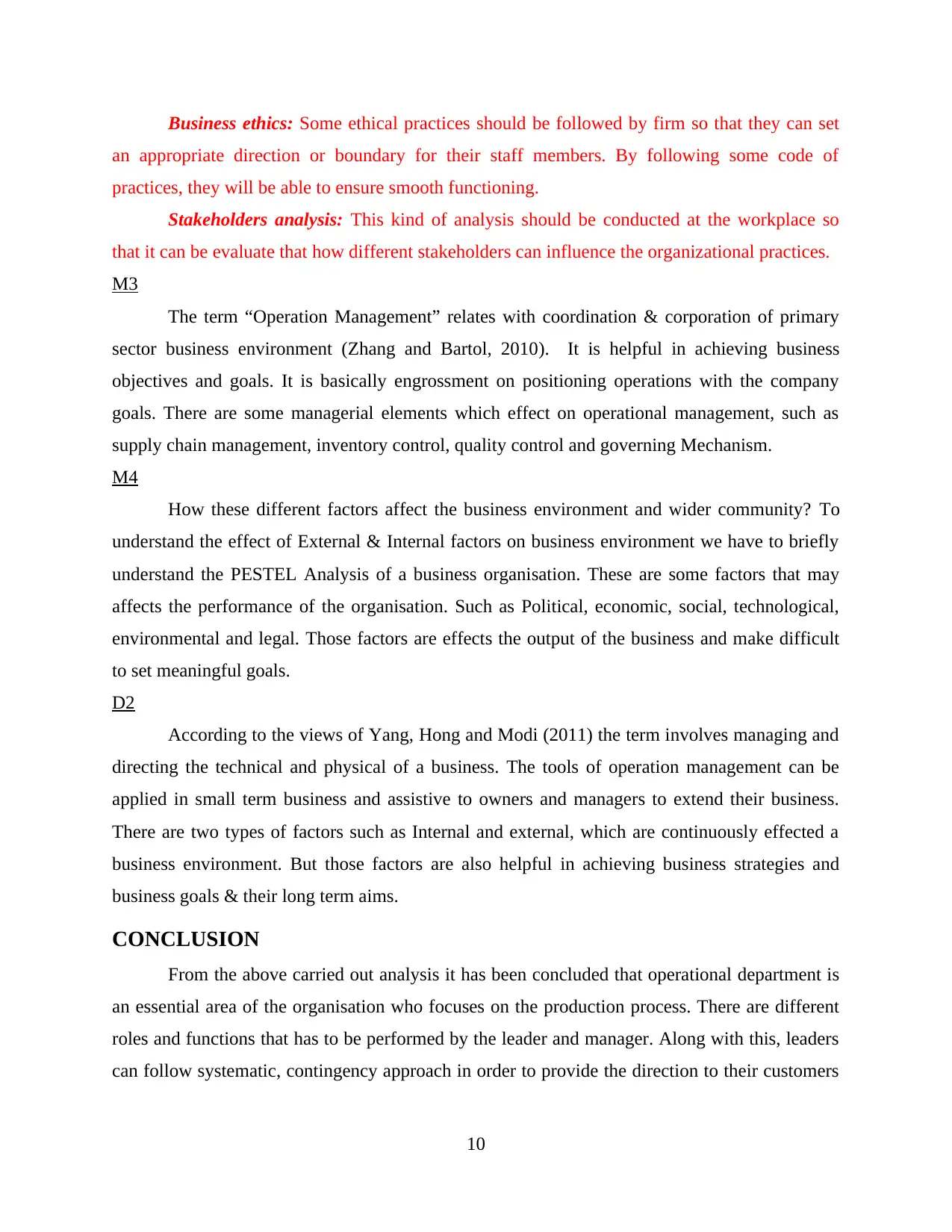
Business ethics: Some ethical practices should be followed by firm so that they can set
an appropriate direction or boundary for their staff members. By following some code of
practices, they will be able to ensure smooth functioning.
Stakeholders analysis: This kind of analysis should be conducted at the workplace so
that it can be evaluate that how different stakeholders can influence the organizational practices.
M3
The term “Operation Management” relates with coordination & corporation of primary
sector business environment (Zhang and Bartol, 2010). It is helpful in achieving business
objectives and goals. It is basically engrossment on positioning operations with the company
goals. There are some managerial elements which effect on operational management, such as
supply chain management, inventory control, quality control and governing Mechanism.
M4
How these different factors affect the business environment and wider community? To
understand the effect of External & Internal factors on business environment we have to briefly
understand the PESTEL Analysis of a business organisation. These are some factors that may
affects the performance of the organisation. Such as Political, economic, social, technological,
environmental and legal. Those factors are effects the output of the business and make difficult
to set meaningful goals.
D2
According to the views of Yang, Hong and Modi (2011) the term involves managing and
directing the technical and physical of a business. The tools of operation management can be
applied in small term business and assistive to owners and managers to extend their business.
There are two types of factors such as Internal and external, which are continuously effected a
business environment. But those factors are also helpful in achieving business strategies and
business goals & their long term aims.
CONCLUSION
From the above carried out analysis it has been concluded that operational department is
an essential area of the organisation who focuses on the production process. There are different
roles and functions that has to be performed by the leader and manager. Along with this, leaders
can follow systematic, contingency approach in order to provide the direction to their customers
10
an appropriate direction or boundary for their staff members. By following some code of
practices, they will be able to ensure smooth functioning.
Stakeholders analysis: This kind of analysis should be conducted at the workplace so
that it can be evaluate that how different stakeholders can influence the organizational practices.
M3
The term “Operation Management” relates with coordination & corporation of primary
sector business environment (Zhang and Bartol, 2010). It is helpful in achieving business
objectives and goals. It is basically engrossment on positioning operations with the company
goals. There are some managerial elements which effect on operational management, such as
supply chain management, inventory control, quality control and governing Mechanism.
M4
How these different factors affect the business environment and wider community? To
understand the effect of External & Internal factors on business environment we have to briefly
understand the PESTEL Analysis of a business organisation. These are some factors that may
affects the performance of the organisation. Such as Political, economic, social, technological,
environmental and legal. Those factors are effects the output of the business and make difficult
to set meaningful goals.
D2
According to the views of Yang, Hong and Modi (2011) the term involves managing and
directing the technical and physical of a business. The tools of operation management can be
applied in small term business and assistive to owners and managers to extend their business.
There are two types of factors such as Internal and external, which are continuously effected a
business environment. But those factors are also helpful in achieving business strategies and
business goals & their long term aims.
CONCLUSION
From the above carried out analysis it has been concluded that operational department is
an essential area of the organisation who focuses on the production process. There are different
roles and functions that has to be performed by the leader and manager. Along with this, leaders
can follow systematic, contingency approach in order to provide the direction to their customers
10
⊘ This is a preview!⊘
Do you want full access?
Subscribe today to unlock all pages.

Trusted by 1+ million students worldwide
1 out of 15
Related Documents
Your All-in-One AI-Powered Toolkit for Academic Success.
+13062052269
info@desklib.com
Available 24*7 on WhatsApp / Email
![[object Object]](/_next/static/media/star-bottom.7253800d.svg)
Unlock your academic potential
Copyright © 2020–2026 A2Z Services. All Rights Reserved. Developed and managed by ZUCOL.





